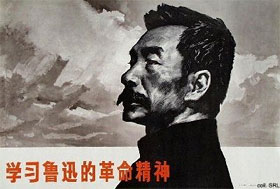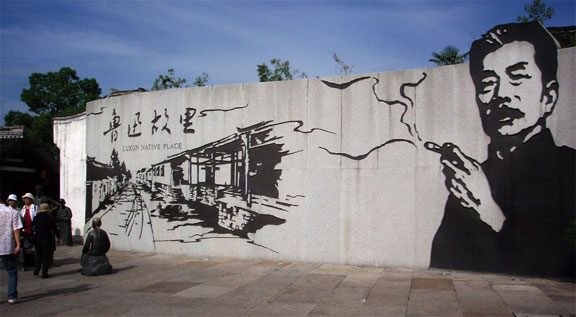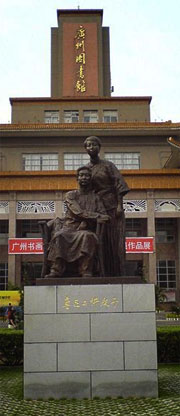When Lu Xun’s birthday came and went last Saturday, the 25th of September, his name understandably popped up in the media, although not in the form of eulogies or praise for the revered father of Modern Chinese Literature. Instead, writers from around China have been discussing Lu Xun’s expulsion from the nation’s textbooks and the Chinese education system, where he had held a comfortable position since the mid-1920s.

The literary and online communities are calling this “Lu Xun’s Great Retreat” and there are already theories floating about trying to explain why this is happening now. The official line has been to claim that different generations require different textbooks to reflect different conditions. In an interview with the chief editor of the Jiangsu Education Publishing Company, the removal of some of Lu Xun’s works are attributed to their length and complexity.
The Chinese blogosphere points to a more sinister motive: the government is nervous about what young children might think about this society if they read Lu Xun’s social and political commentaries, look around and see that history is busy repeating itself.
Today’s Lu Xun
So what is changing now and why are people in an uproar about it?
It turns out that not only are three well-known Lu Xun stories being axed from the school’s textbooks, but several other classic tales and contemporary stories are also being replaced. A list has circulated through the Internet and is stirring up even more controversy then the removal of Lu Xun’s stories because, according to the list, three foreign pieces are going to be added to the compulsory reading education classes in all grades. Below is the list in Chinese and English, provided by an Education-related forum (another, slightly different list can be read here at Xinhua.net):
Curriculum Changes
To Be Added:
Michel de Montaigne “On Loving Life” ?????????
Ernest Hemingway “The Old Man and the Sea” ??????????
Dr. Martin Luther King Jr. “I Have a Dream” ????·??????????
Cai Yuan Pei, Chancellor of Peking University ?????????????????
Yu Hua, “Leaving Home at Eighteen” ????????????
Du Fu “Poetic Thought on Ancient Sites” ?????????
Liu Yong, “Watching the Tidal Bore” ????????
Su Shi (Su Dongpo)?”Calming the Waves” ????????
Xin Qi Ji, “Water Dragon Chant” ?????????
Dai Wangshu, “A Lane in the Rain” ????????
Bian Zhi Lin, A Broken Stanza ????????
To Be Removed:
Cao Yu, “Thunderstorm” ??????
Zhu Zi Qing, “A view of father from the back” ???????
Southeast Fly the Peacocks ?????????
Su Shi (Su Dongpo), “Record of Stone Bell Mountain”
Su Xun, “About the Six Dynasties” ????????????
Ouyang Xiu, Sequence to Biography of the Actors ?????????????
Gong Zi Zhen, The House of Sick Mei ?????????????
Lu Xun, “Medicine” & “Ah Q” & “Miss Liu He Zhen” ??????? Q???????????
From this list it is hard to tell exactly what the education system might be doing, but for the Chinese netizens, there are many very clear reasons to raise a ruckus.
The Dispute
First and foremost, the loyal lovers of Lu Xun see any removal of any of his essays as a form of literary heresy because Lu Xun represents (among other things) the struggling, defiant Chinese spirit. Most of his essays excoriate the corrupt leaders of a weak and cowardly society while sympathizing with the downtrodden Old One Hundred names that make up the back bone of Chinese society. To toss out his articles is a political move and will engender a political response, especially the three listed above.
In this long and in depth analysis for the China Educational Daily, Wu Xiao Ou argues that Lu Xun’s works represent China and the Chinese character and therefore are free from the fetters of generational ideas and political realities. All Chinese should read Lu Xun because Lu Xun wrote about and for all Chinese.
Yet, if this is really a move by the censors to remove certain troublesome aspects of Lu Xun’s literature, then this would not be the first (or presumably the last) time. In 2007, there were discussions concerning the removal of Miss Liu Hezhen, which was supposedly replaced with Jin Yong’s Kung Fu inspired short stories. In fact, the Chinese education system has a long history of re-arranging its curriculum based on the winds of change and Lu Xun is just one of the more prominent victims.
If one takes the time to read and analyze all of the works above and then place them within the context modern Chinese society, there probably is a valid reason why the Story of Lin Xiangru is being replaced with MLK’s Speech. That is beyond the scope of this essay, because when this began it was under the assumption that Lu Xun alone was being removed and after further research the truth, whatever that might be, has become blurred by the competing, confused cries of Chinese Netdom.

No One Can Be Sure

Something is happening within the Chinese education system. It might be political revisionism, which has many a precedent in China (and in the US school system for that matter) or it might be a modernization of the system through the introduction of foreign writers (which also has precedent in China) or it could be a sinister plot to protect the filthy rich bastards that speed around in unlicensed black sedans by leaving out any social commentary texts that might help children see them for they are: filthy rich bastards. Many a precedent for that last one.
Or nothing is happening at all, which is the case according to this article published in China’s Education Daily, which quotes yet another Jiangsu Education Publishing Company editor as saying that, NO, there were no changes made whatsoever to any of the textbooks in any grade.
This could be a classic case of news leaking and then the officials responding by obfuscating any and all references to the news or it could be a phenomenon known as “fake news,” in which the Chinese gossip mill fueled by a million bulletin board groups and 370 Million users takes a snippet of something and turns it into a mountain.
We don’t really know. But we’ll follow this story to its murky end and keep you, the reader, informed of what muck we step in. If any of you can shed light upon the subject or have an opinion or thought to share, we welcome your comments below.
For a continuation of this discussion, head over to ChinaTravel.net …
Great post. Next!
LOL next is up next week and will involve a trip to the Lu Xun shrine in Shanghai … till then I am relying on you guys to come up with some more clues and thoughts about education in China 😉
Interesting… Though my understanding was that textbooks are chosen by provincial education bureaus, and therefore can vary slightly from province to province. Am I wrong about this?
You are right, there are five big publishing companies:
The Peoples
Jiangsu Provincial
Guangdong Provincial
Yu Wen (Literary)
Shandong Provincial
and all the others basically either buy their books or take their cues from what these big five do. The Jiangsu people threw themselves into the fray by having two “editors” give two conflicting statements as to whether or not changes were made …
Thanks for the clarification :). From what I can tell Lu Xun may or may not have been excised from the Jiangsu textbooks, but he remains in the others?…
I recall the debate in 2006 kicked off by Shanghai’s decision to use history textbooks that diminished the role of Mao. Perhaps the education authorities in the Shanghai/Jiangsu region are more revisionist than elsewhere? I’m not sure what happened in the end there. There was such a fuss that I think in the end they went back to the old textbooks.
Lu xun is my favorate auther
We have his airticle since our primery school.
《孔乙己》
and so on
every term have 2 or 3 of luxun’s airticle
most of them is critical the society and the bad sprit of Chinese or even human beings.
Many of my classmates don’t like Luxun because it’s difficult to understand some of his airticle.That’s ture,every airticle of him need our think and think again to understand it,and make us continue thinking.
Sacha,it seems that you kown a lot about Chinese literiture
What is it about Luxun that makes his writing so controversial?
I was in the Chengdu Bookworm yesterday and saw a three-volume set of “Luxun’s Selected Works”
cctv-10 have a program called 先生鲁迅
you can found it on youku
This seems pretty random. Why cut this guy off in 2010?
hey guys,
I just bought a 4-volume set of selected works for 140RMB .. good good stuff.
You know it does seem pretty random, but having read a lot of the works listed above over the last two weeks, I can only say that the new stuff is pretty apolitical for China — even though MLK’s speech is very political, it resonates not as political rhetoric here, but as inspirational rhetoric and perhaps indirectly a criticism of the US.
The only truly political stuff on the list that i can see are the Lu Xun essays, which describe a China and Chinese Man that is weak, ignorant, capricious and unjust and calls for a New China. Most people I have spoken to hold Lu Xun’s essays to be dated — as in, they were relevant pre-Liberation, but now that’s all done with. New China has arrived.
Perhaps the education system wants to keep it that way.
If not for that small thread, it would def. seem random and more the product of renewal than actual political/social consideration. I dont know.
You guys even know LuXun, you win! Anyway, indeed some of LuXun’s articles should be removed, ’cause his minds and political position are not suit for current generation any longer.
@Tristan,
One should study History’s ups and downs, no matter if they’re politically or philosophically similar to nowadays’. Everyone learns from experience to avoid ending up suffering the same situations again, but our lives are too short and we need to learn about the past from people who lived those times. A proper knowledge of History makes people clever enough to prevent them from being “led” unconsciusly into certain situations.
Hey:
Just in case you missed it, there is a “Part 2” to this posted here:
http://blog.chinatravel.net/culture-history/shanghais-lu-xun-park-seeking-the-soul-of-a-nation.html
check it out!
Evolution of the chinese education system.. Right 😉